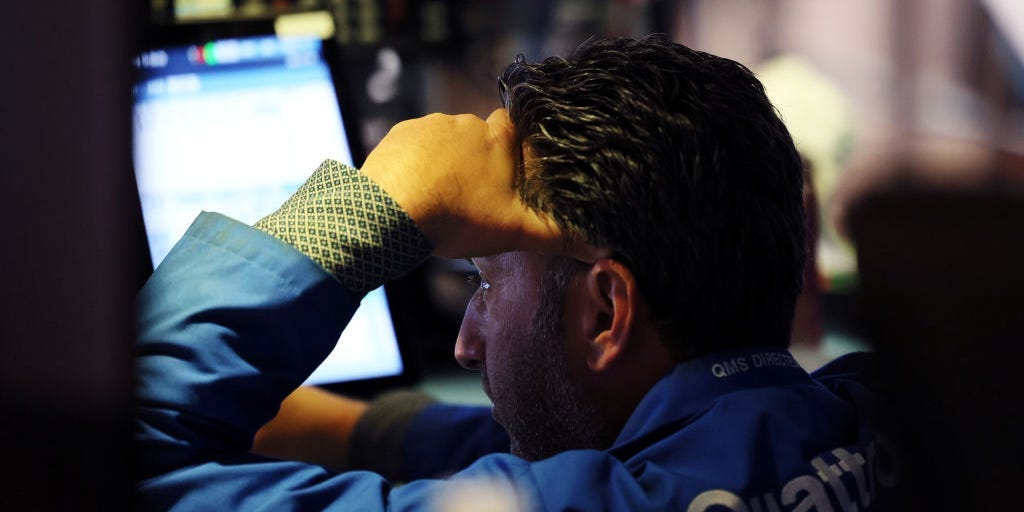US stocks ended lower Monday, marking a fourth consecutive decline amid worries about the economy. JPMorgan CEO Jamie Dimon said a recession could push stocks down by another “easy 20%.” Chip stocks fell as the Biden administration ramped up limits on chip sales to China. Loading Something is loading.
Thanks for signing up!
Access your favorite topics in a personalized feed while you’re on the go.
US stocks closed lower Monday on festering worries about higher-for-longer interest rates and an economic recession while investors prepare for an incoming wave of corporate financial updates.
All three of Wall Street’s major indexes lost ground for a fourth consecutive session. Seven of the S&P 500’s 11 sectors fell, led by the overall high-flying energy group.
Among tech stocks, shares of semiconductor and chip-equipment makers, including Nvidia and KLA-Tencor, dropped after the US stepped up export controls on chip sales to China. The Philadelphia Semiconductor index, or SOX, hit a nearly two-year low during the session.
Here’s where US indexes stood at the 4:00 p.m. closing bell on Monday:
S&P 500: 3,612.39, down 0.75%Dow Jones Industrial Average: 29,202.88, down 0.32% (93.91 points)Nasdaq Composite: 10,542.10, down 1.04%Stocks fell before third-quarter corporate earnings season heats up this week, with figures due from investment banks including JPMorgan Chase and Morgan Stanley.
JPMorgan CEO Jamie Dimon told CNBC on Monday he can see the stock market falling another “easy 20%” from current levels as a recession is likely to hit the US economy over the next six to nine months.
Meanwhile, Chicago Federal Reserve President Charles Evans said he foresees interest rates moving higher and staying elevated. The Fed in November is expected to raise interest rates for the sixth time this year as it battles inflation that’s been hovering at over 8%.
“I see the nominal funds rate rising to a bit above 4-1/2 percent early next year and then remaining at this level for some time while we assess how our policy adjustments are affecting the economy,” he said in remarks at the annual meeting of the National Association for Business Economics.
The fed funds rate has been pushed up to 3%-3.25% from zero early this year.
“Front-loading was a good thing, given how far below neutral rates were. But overshooting is costly, too, and there is great uncertainty about how restrictive policy must actually become,” said Evans.
The September consumer price index report is due on Thursday.
Here’s what else is happening today:
Former Federal Reserve Chair Ben Bernanke was part of a trio that won the Nobel Prize for economics for their work on banks and financial crises.The Bank of England ramped up its emergency buying of UK government bonds as it launches temporary measures to further ease financial stress on pension funds. Billionaire hedge fund manager Paul Tudor Jones said a “recession playbook” would see stocks fall by 10%. Treasury Secretary Janet Yellen brushed off worries that the soaring US dollar is unbalancing markets. Economist Mohamed El-Erian said the Fed “made two big mistakes” that could result in a “damaging” recession. The European Union, which is trying to reduce its reliance on Russian energy, remained the largest importer of Russian fossil fuels in September, according to a report.In commodities, bonds, and crypto:
West Texas Intermediate crude lost 2% to $90.77 per barrel. Brent crude, the international benchmark, fell 0.5% to $95.70. Gold moved 1.9% lower to $1,677 per ounce.The US bond market was closed for Columbus Day. The 10-year Treasury yield ended Friday’s session at 3.89%. Bitcoin slumped 1.2% to $19,235.11.
